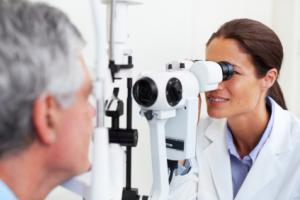
Ever been staring at a bright, clear sky or a white computer screen and see a little string or speck drift across your eye? Those are called eye floaters, and for the most part, they’re harmless. But in some cases, they’re a sign of a medical emergency. Read on to learn how to tell the difference.
What floaters are:
Floaters and spots are typically tiny pieces of the vitreous, the part of the eye between the lens and the retina, that occasionally break loose within the inner back portion of the eye. What you’re actually seeing is not the pieces themselves, but their shadows cast on the retina. If you’ve ever tried to follow one, it never seems to stay put. That’s because they move when your eye moves, causing them to drift about. Eye flashes are caused by the optic nerve being stimulated. This can happen through mechanical stimulation, like getting hit in the head and “seeing stars,” or when the retina is tugged, torn or detached from the back of the eye.
When to be concerned:
If you see a high density of floaters accompanied by light flashes, get medical attention immediately. The sudden presence of these symptoms could mean a posterior vitreous detachment or a much more serious retinal detachment. A late 2009 study by the Journal of American Medical Association found the sudden onset of eye floaters and flashers meant one in seven people with these symptoms will have a retinal tear or detachment. A retinal detachment is treatable, but an eye surgeon must reattach the retina as soon as possible to avoid permanent vision loss.
How to get treatment:
Most people don’t seek treatment for eye floaters. Although if you are experience floaters so numerous they impair your vision, talk to your eye doctor about laser therapy in which lasers break up the debris in the vitreous or a vitrectomy procedure in which the vitreous is replaced with a saline liquid.
If you have any doubt as to whether the floaters and flashes you’re seeing are a sign of something serious, do not hesitate to talk with your eye doctor.





